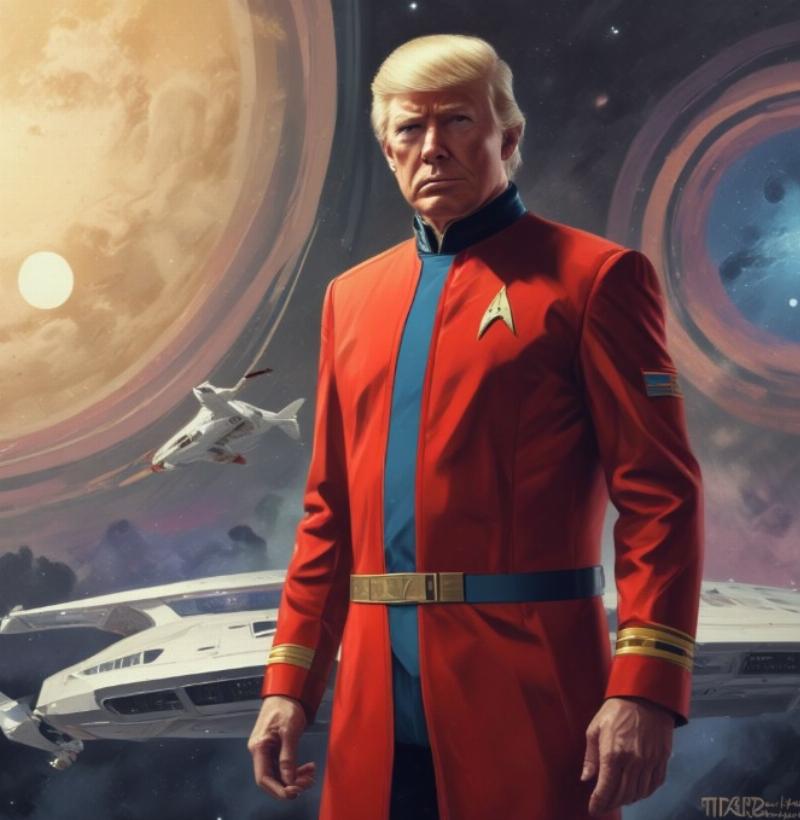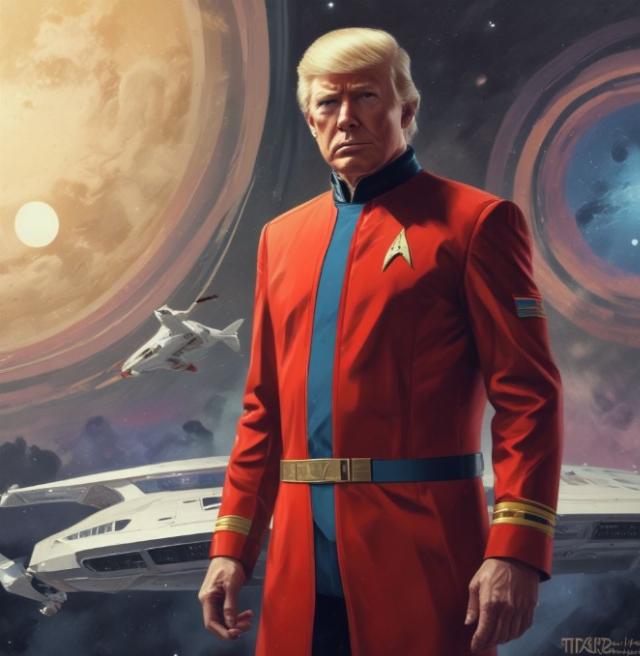


In 1966, when “Star Trek” debuted on NBC, Donald Trump was starting his junior year of college, so it’s unlikely he was spending an hour a week following the Enterprise where no man had gone before. Yet, anyone who did follow that original series through its (abbreviated) five-year mission from 1966 to 1969 recognizes aspects of President Trump’s behavior in examples from its characters, both Federation and alien.
The rift between President Trump and Elon Musk is a perfect reminder that Trump subscribes to the Talosian school of persuasion. Introduced in the original series pilot “The Cage” (which was later repurposed as the two-part episode “The Menagerie”), the inhabitants of Talos IV are a race of beings so intellectually advanced that they have developed hypertelepathy: Not only can they read minds, they can force other beings to experience any illusion they wish, complete with totally immersive sensation. Thus, when they wish to control another creature’s behavior, they use a combination of illusions of agonizing pain and ones of pleasantness and pleasure. As a Talosian tells Captain Pike, “Wrong thinking will be punished. Right thinking will be as swiftly rewarded.”
For many months, Elon Musk found his expressions of right thinking amply rewarded with Trump’s praise and access to Trump’s inner circle. He reveled in his newfound role as a political force, a player in the new Administration, and a personal favorite of the President.
But Musk clearly never learned the lesson of “The Menagerie.” If he had, he might have noted how Trump dealt with rivals like Ted Cruz, Marco Rubio, and Nikki Haley. When Cruz and Rubio ran against him for the Republican nomination in 2016, he punished their wrong thinking with ridicule and personal insults. Once they finally reconciled themselves to Trump’s victory, dropped their adversarial stance toward him, and began to praise him, he responded by rewarding their right thinking. Thus, Rubio became Secretary of State and Cruz received Trump’s endorsement at a Texas campaign rally. When Haley ran against him in 2024, she went from trusted Trump adviser to pariah.
 If he’d recalled those examples, Musk would have known that the rewards Trump gives for right thinking depend on continuing to think right. When Musk denounced the President’s signature initiative, calling the Big Beautiful Bill a disappointment, he displayed wrong thinking, and Trump responded by chiding Musk. Instead of muting his criticism, Musk attempted to retaliate by calling the bill a “disgusting abomination,” agreeing with a call for impeaching Trump, and saying Trump’s name is in the Jeffrey Epstein files. Given Trump’s lifetime of applied studies in the Talosian school, this is not likely to end well for Musk, never mind that the office of the President of the United States carries more power that even Musk’s billions in wealth.
If he’d recalled those examples, Musk would have known that the rewards Trump gives for right thinking depend on continuing to think right. When Musk denounced the President’s signature initiative, calling the Big Beautiful Bill a disappointment, he displayed wrong thinking, and Trump responded by chiding Musk. Instead of muting his criticism, Musk attempted to retaliate by calling the bill a “disgusting abomination,” agreeing with a call for impeaching Trump, and saying Trump’s name is in the Jeffrey Epstein files. Given Trump’s lifetime of applied studies in the Talosian school, this is not likely to end well for Musk, never mind that the office of the President of the United States carries more power that even Musk’s billions in wealth.
On another front, Trump’s use of tariff policy echoes a technique Captain Kirk invented in the episode “The Corbomite Maneuver.” Faced with an unidentified alien adversary with technology far superior to the Enterprise’s, Kirk responds to an impending threat of annihilation by telling the alien commander that ethical considerations require that he warn the alien that the Enterprise carries corbomite, a material capable of absorbing any destructive force directed at the starship and directing it back on the attacker. As Kirk explains to Mr. Spock, this is a poker bluff, but it deters the alien. As it transpires, the alien is also bluffing: his mission is not warfare but finding and assessing new species, much the same as Kirk’s. Trump has lately used tariff policy in a series of bluffs to force responses from America’s trading partners, friend and foe alike, and establish the principle of corbomite-style reciprocity. Of course, the difference is that Trump can back up his bluffs with something more than an imaginary fail-safe device.
Trump has mastered the power of uncertainty and confusion to confound his opponents. In “I, Mudd,” Kirk and his crew use absurdist illogic to short out a network of androids; in “A Piece Of The Action,” Kirk invents Fizzbin, a card game with nonsensical rules, to distract alien captors and make his escape. From the campaign on, Trump has used rapid-fire policy proposals (for example, no tax on tips), policy swerves (on-again, off-again tariffs), and a relentless tempo of activity to destabilize and dizzy both those who oppose him and those over whom he wants to gain a negotiating edge. The current state of the Democratic Party shows how effectively Trump uses this technique.
Finally, the greatest parallel between “Star Trek’s” world and Trump’s lies in the importance of the art of the deal. Kirk has a propensity to resolve disputes with and between alien species with dealmaking, often by pointing out to a powerful party the advantages of working with a weaker party for mutual benefit rather than exploiting them. He even brokers a deal with a silicon-based life-form that saves her species and gives a mining colony unprecedented access to rich veins of minerals.
This echoes Trump’s deal with Ukraine for access to rare earth minerals. Trump thrives on the possibility of making deals no one else can make to replace conflict with mutual benefit. While the outcomes with respect to Ukraine-Russia, Israel-Gaza, and Iran’s nuclear program remain uncertain, Trump’s approach to each is to find a deal, if possible, to avoid or end bloodshed.
Other than the design of the Space Force logo, there’s no evidence that President Trump is a “Star Trek” fan (and in 2016, many cast and crew members of the various “Star Trek” series and movies formed the Trek Against Trump group to oppose Trump’s election). Still, studying the original “Star Trek” series can give one a valuable framework to understand Trump’s thinking and actions.
Image: AT via Magic Studio
